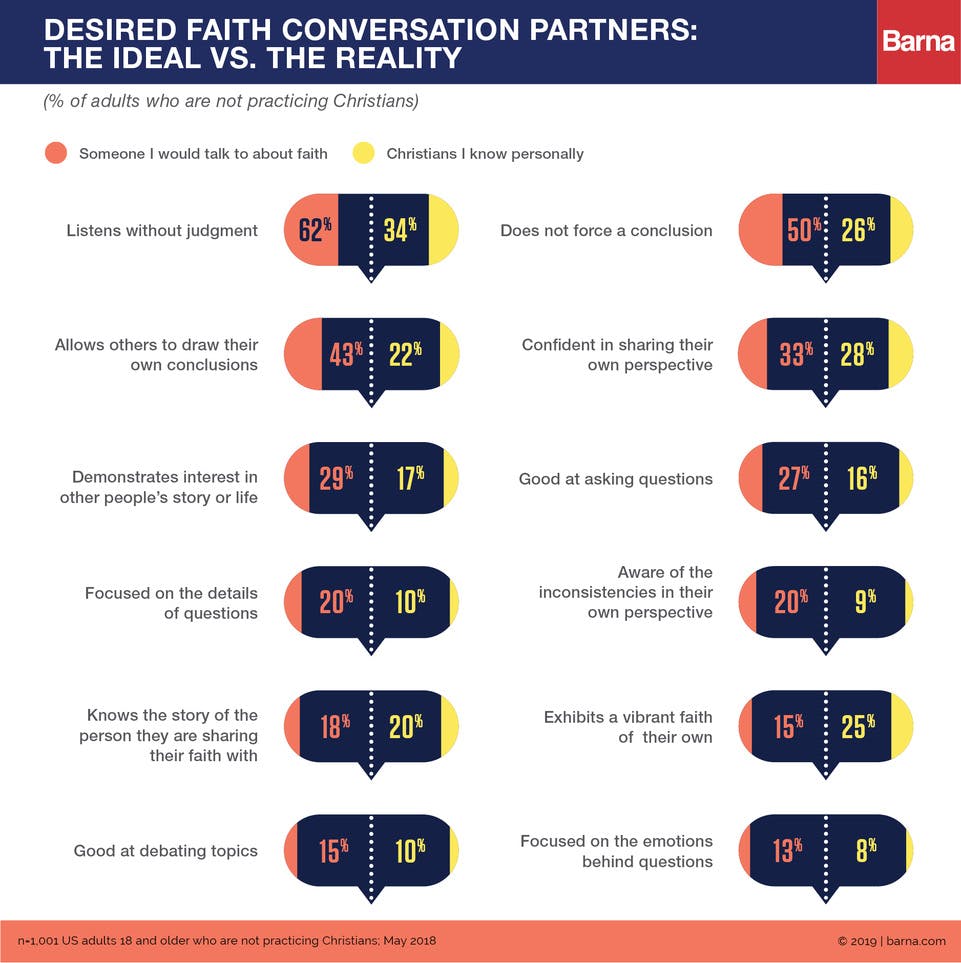What Non-Christians Want from Faith Conversations

A growing secularization and a waning interest in religious matters have contributed to tension in faith conversations today. This apathy is spreading among Christians themselves; as Barna recently reported, almost half of practicing Christian Millennials say evangelism is morally wrong. Our recent report Reviving Evangelism, produced in partnership with Alpha USA, looks at the faith-sharing experiences and expectations of Christians and non-Christians alike. The study points to a stark gap between who non-Christians want to talk to about faith and the Christians they actually know.
Nearly all non-Christians (identify with a faith other than Christianity or no faith at all) and lapsed Christians (identify as Christian but have not attended church within the past month) have a friend or family member who practices and prioritizes Christianity—but these believers may not be their ideal conversation partners when it comes to faith. For instance, more than six in 10 non-Christians and lapsed Christians (62%) say they would be open to talking about faith matters with someone who listens without judgment—the top quality they value—but only one-third (34%) sees this trait in the Christians they know personally. Similarly, their hopes of talking with Christians who do not force conclusions (50% vs. 26%), demonstrate interest in other people’s stories (29% vs. 17%) and are good at asking questions (27% vs. 16%) appear to go unfulfilled.
Further, the data paint a striking picture of disconnection between Christian ideals of what it means to share faith effectively and the experience of non-Christians—and between non-Christians’ expectations of Christians and Christians’ perceptions of themselves. For example, though practicing Christians mostly agree with non-Christians and lapsed Christians on the traits that make a good faith conversation partner, they are more likely to emphasize qualities like being confident in sharing their own perspective (58% vs. 33% of non-Christians and lapsed Christian), exhibiting a vibrant faith of their own (57% vs. 15%) or helping others have a spiritual experience of God for themselves (53% vs. 13%).
Just as non-Christians and lapsed Christians fail to see desired conversational traits in the Christians they know, practicing Christians are hesitant to say some of the same descriptions are true of themselves. For instance, three-quarters of practicing Christians (76%) believe someone who listens without judgment is gifted at sharing their faith, but only 44 percent believe it is completely true of themselves. Again, the trend continues when it comes to being someone who doesn’t force a conclusion (54% vs. 41%), demonstrates interest in other people’s stories or lives (56% vs. 39%) or asks good questions (44% vs. 26%).
However willing they may be, Christians’ ability to witness for Christ may be impeded by the simple fact that they don’t have meaningful relational connections with non-Christians, or the conversational skills necessary to talk meaningfully about faith.
About the Research
Research for this study included two nationally representative studies of U.S. adults. The first was conducted using an online panel May 8–17, 2018, with 992 practicing Christians. A similar study was conducted online with a nationally representative study of 1,001 U.S. adults who do not meet the criteria for practicing Christians. Both lapsed Christians and non-Christians were interviewed. Both studies have margin of error of ±3 percent at the 95-percent confidence level. Respondents were invited from a randomly selected group of people matching the demographics of the U.S. population for maximum representation. Researchers set quotas to obtain a minimum readable sample by a variety of demographic factors and then minimally weighted the data by ethnicity, education and gender to reflect their natural presence in the known population, using U.S. Census Bureau data for comparison.
Practicing Christians identify as Christian, agree strongly that faith is very important in their lives and have attended church within the past month.
All others are U.S. adults who are not practicing Christians under the definition above. These fall into two main groups:
- Lapsed Christians identify as Christian but have not attended church within the past month. Only 4 percent consider their faith very important.
- Non-Christians identify with a faith other than Christianity (“religious non-Christians”) or with no faith at all (“atheists / agnostics / nones”).
Photo by Joshua Ness on Unsplash
© Barna Group, 2019
About Barna
Since 1984, Barna Group has conducted more than two million interviews over the course of thousands of studies and has become a go-to source for insights about faith, culture, leadership, vocation and generations. Barna is a private, non-partisan, for-profit organization.
Related Posts

What Are Non-Christians’ Views of God?
- Culture
- Faith

Actions, Invitations, Storytelling—How Gen Z Approaches Evangelism
- Faith
- Generations

Beyond an Invitation to Church: Opportunities for Faith-Sharing
- Culture
- Faith
-
From the Archives
Lead with Insight
Strengthen your message, train your team and grow your church with cultural insights and practical resources, all in one place.
Get Barna in Your Inbox
Subscribe to Barna’s free newsletters for the latest data and insights to navigate today’s most complex issues.








